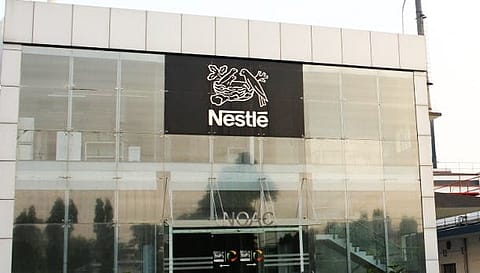Nestlé India posts record sales in Q2, FMCG sector rallies
Three of Nestlé’s four product groups - excluding Milk Products & Nutrition - achieved double-digit growth.

Nestlé India kicked off the FMCG earnings season on a strong note, reporting its highest-ever quarterly sales under the leadership of new managing director Manish Tiwary. The company’s Q2FY26 results beat both Nuvama’s and consensus estimates, helping lift the FMCG index by 1.5%.
Revenue stood at ₹5,630 crore, up 10.9% year-on-year - above Nuvama’s and consensus estimates by 7.4% and 4.8%, respectively. Domestic sales rose 10.8%, supported by broad-based volume growth across categories. EBITDA came in at ₹1,240 crore, up 5.9% YoY and ahead of estimates, with margins at 21.9%.
“Margins were slightly below expectations, but EBITDA was ahead of estimates, reflecting disciplined cost management despite input headwinds,” said Abneesh Roy, executive director, Nuvama Institutional Equities.
Profit after tax stood at ₹753 crore, down 2.9% YoY, while earnings per share rose marginally to ₹3.90 from ₹3.88 last year. Roy noted that this performance “marks a great start to the FMCG results season and signals a turnaround in urban consumption, which accounts for nearly 75% of Nestlé’s sales.”
Three of Nestlé’s four product groups - excluding Milk Products & Nutrition - achieved double-digit growth. Confectionery was a standout, led by KitKat, with India now the second-largest KitKat market globally. Beverages continued high double-digit growth, driven by Nescafé and its premium offerings such as Nescafé Gold. Prepared dishes and cooking aids, powered by Maggi Noodles and Masala-e-Magic, also saw strong traction. The pet food segment delivered its highest growth since integration, with new Friskies variants launched during the quarter.
Under Tiwary, formerly with Amazon, Nestlé sharpened its focus on digital and e-commerce channels. Online sales surged through thematic launches like KitKat Delights and Maggi Double Masala, while exports grew in double digits, led by Nescafé and KitKat sales to the Middle East and Southeast Asia.
Nuvama expects the recently announced GST rate cuts to benefit Nestlé from Q3FY26 onwards. “Most of Nestlé’s portfolio, including confectionery, instant coffee, Maggi, condensed milk, and infant nutrition, now attracts 5% GST, while UHT milk is at 0%. This will enhance consumer affordability and improve demand momentum,” said Roy. He added that while channel partners are likely to destock before the new rates take effect on September 22, “re-stocking will follow swiftly as consumer demand picks up.”
Recommended Stories
Roy said Nestlé’s execution under the new MD has been “no-nonsense and focused,” and that the company “appears to have managed GST disruptions better than most peers.”
With urban demand recovering and input costs expected to stabilize, Nuvama remains positive on the stock from a one-year perspective.